
"Goodness is the Golden Rule" - Interview with Kirsten C. Kunkle
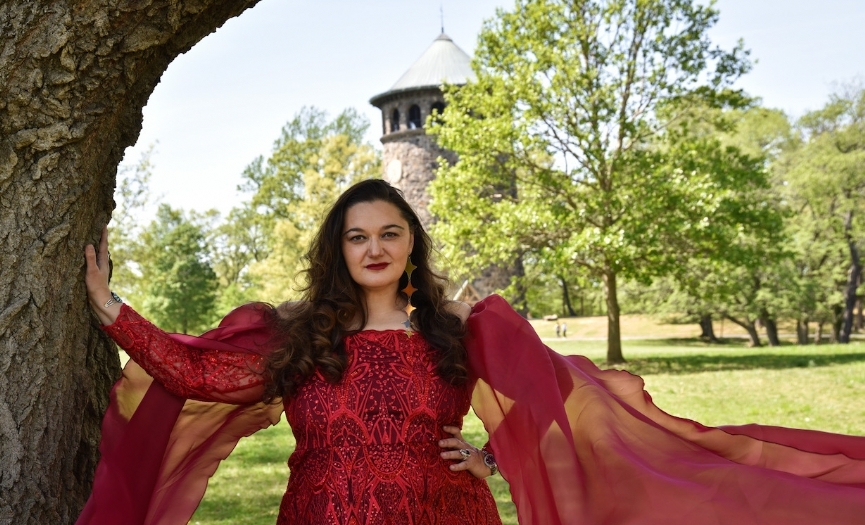
By Bessy ADUT
Dr. Kirsten C. Kunkle is the Co-Founder and Artistic Director of Wilmington Concert Opera, the women and minority run opera company based in Wilmington, Delaware. Some of her favorite roles include creating the role of Charlotte Corday in Girondines, Dido in Dido and Aeneas, Rosalinde in Die Fledermaus, Die Knusperhexe in Hänsel und Gretel, Contessa in Le nozze di Figaro, Agathe in Der Freischütz, Mimì in La boheme, Magda in The Consul, and the title role in Suor Angelica. Other career highlights include performing at Carnegie Hall, being featured in the role of Arabella in the NAXOS world premiere recording of Johann Strauss II’s operetta Blindekuh, writing for OPERA AMERICA magazine, and premiering her first opera libretto, Girondines, with composer Sarah Van Sciver.
A voting citizen of the Mvskoke Nation, Kunkle has been lauded as the leading Native American soprano in today’s classical music world. She was commissioned and premiered her new art song Reclaim the Land at Yellowstone National Park’s 150th anniversary, which has been featured on All Things Considered on NPR and BBC Radio. 2023 marked her performance debut and a composition commission with Chicago Fringe Opera and stage direction, choreography, and performance debut with Mission Opera in Los Angeles. In 2024, she was commissioned for her first instrumental work for flute and piano for Rose Bishop and Abbey Brewer, as lead commissioners as part of a consortium, entitled Inspiration of the Muses, which premiered at New Music Chicago. Also in 2024, she was commissioned to write an eight-part a capella choral work entitled Mvskoke, Este’Cate: We are Still Here (Muscogee People, Native People: We are Still Here) as part of a grant for Indigenous choral music, which was funded by the National Endowment for the Arts for the Trey Clegg Singers, and premiered in Atlanta. She is part of a group of composers writing songs about chronic illness and major life moments for My Black Swan Songs, commissioned by mezzo-soprano Molly Noori of The Chronicled Voice.
She is extremely involved in new music and recently premiered the role of Ipp’osi’ in the first opera written entirely in the Chickasaw language, Loksi’ Shaali’ by Jerod Impichchaachaaha’ Tate with Canterbury Voices.
Kirsten has recently performed with the Toledo Choral Society as the soprano soloist for Messiah, The Seven Last Words of Christ, the world premiere of the Great Lakes Cantata for their Centennial Jubilee, Considering Matthew Shepard, and Carmina Burana. She has also been the Artist in Residence with Firelands Symphony Orchestra Chorale, performing the soprano soli in Poulenc’s Gloria, Forrest’s Requiem for the Living, and the world premiere of Matthew Kennedy’s A Prayer for Peace.
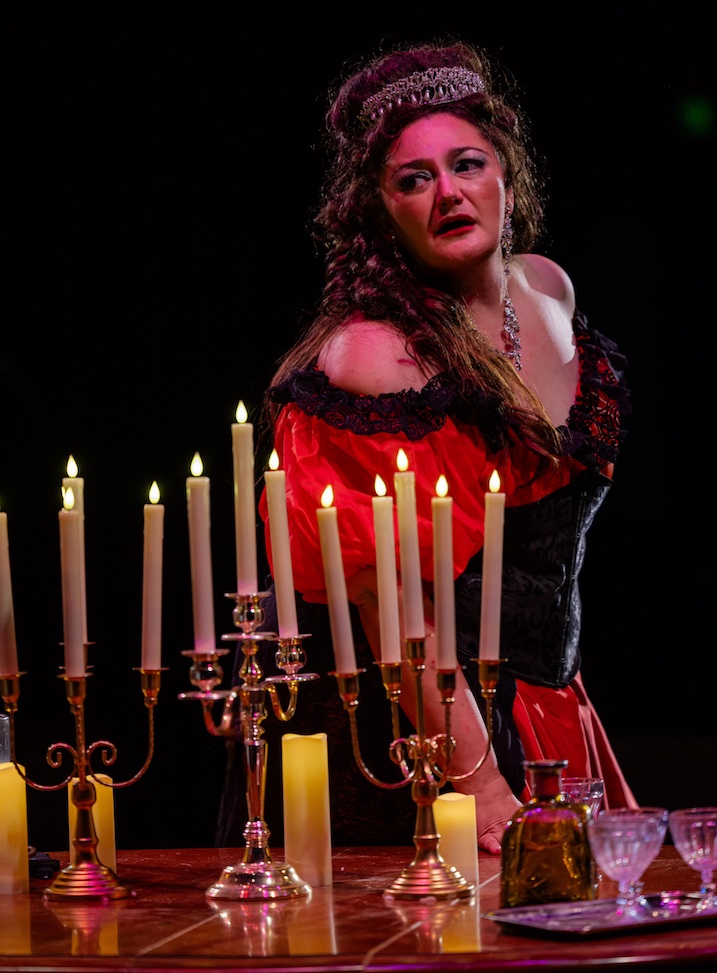
Tosca - photo credit to Wesley Jow
Highlights of the 2024-2025 season include making her role debut as the title role in Tosca with Mission Opera and returning to Firelands Symphony Orchestra twice in the 2024-2025 season, performing as a soloist for the An American Salute concert and Beethoven’s Symphony No. 9. She also made her Oklahoma City Philharmonic debut with the world premiere of Jerod Tate’s An American Indian Symphony, her Voices of Ascension debut in the world premiere of Danielle Jagelski’s Holy Ground, and just made her PostClassical Ensemble debut singing Knoxville: Summer of 1915 at the Kennedy Center.
She is a proud graduate of Bowling Green State University and the University of Michigan, as well as having studied at the University of Salzburg as an exchange student. She currently makes her home in Sandusky, Ohio, with her husband Jason and daughter Stephanie.
Where are you located?
Sandusky, Ohio.
What are your current projects?
I just finished a production of “Tosca” in my debut in the title role with Mission Opera in Santa Clarita, California. This was my second time working with Mission Opera. The first experience that I had with them was in October 2023, when we did the West Coast premiere and first staging of my opera with composer Sarah Van Sciver, “Girondines.”
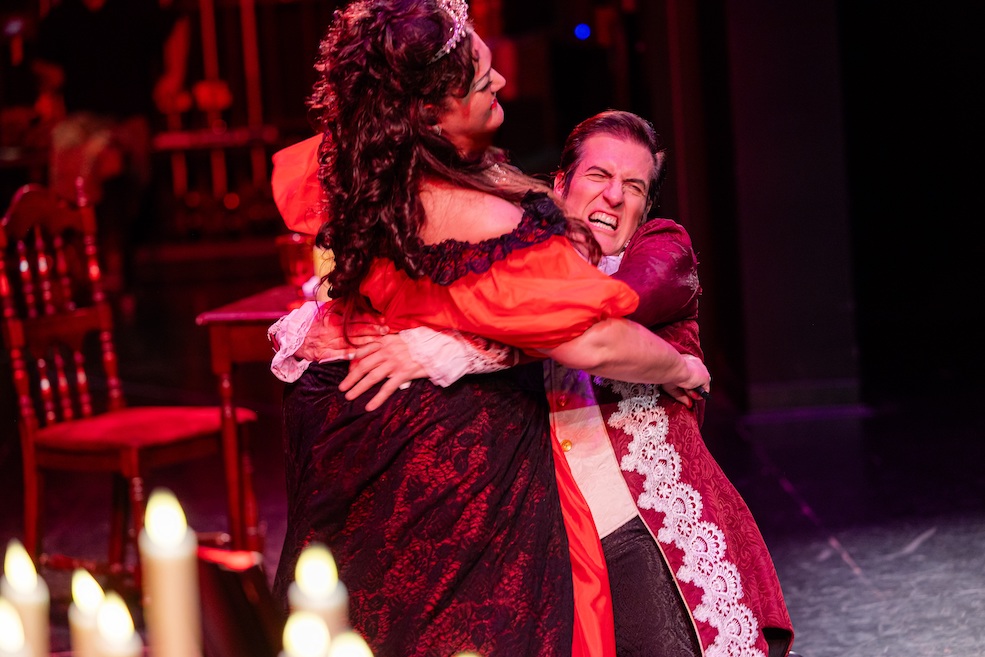
Tosca - photo credit to Wesley Jow
Up next is my first “Der Ring des Nibelungen” with Wagner in Vermont through TUNDI productions in August. I am playing the role of Wellgunde, who is one of Die Rheintöchter (Rhinemaidens). I am also covering the roles of Gerhilde, a Valkyrie, and Dritte Norn, or third Norn. I’ll be working on three of the four Ring Cycle operas for these three roles.
After that, I’m back to Wilmington, Delaware, with my opera company, Wilmington Concert Opera. In addition to serving as Artistic Director for WCO, I will be singing the role of Antonia in “Les Contes d’Hoffmann.”
In addition, I’ve been working on quite a bit of new repertoire which specializes by First American composers, including having recently sung a few world premieres, including “Loksi’ Shaali’” and “American Indian Symphony” by Jerod Impichchaachaaha' Tate and “Holy Ground” by Daniel Jagelski. A First American composer myself, I’ve also been working on some new compositions, including three songs for mezzo-soprano Molly Noori’s new album “My Black Swan Songs.”
Please share how you started and got to where you are today...
My mother was a pianist and a ballet dancer, and was deeply invested in the arts throughout her life. She put me in piano lessons and ballet, and acting classes at a young age. When I was twelve, I got started in voice lessons with the amazing Barbara Kondalski. Although I had already participated in musicals for years, she directed me to the world of opera. I sang in the chorus of “Tosca” when I was thirteen, and from there, I ended up singing classically. Eventually, I received a Bachelor of Musical Arts from Bowling Green State University in voice performance, with minors in Italian and German, and even spent my senior year abroad in Austria. From there, I achieved a Master of Music and a Doctorate of Musical Arts degrees from the University of Michigan. I spent years teaching at the collegiate level, as well as singing and auditioning. I had a number of wonderful experiences, including a Carnegie Hall debut, having my European debut with the Sofia Philharmonic and recording a Naxos recording, and being involved as a soloist in numerous world premieres. Since the pandemic, I have been working as both a composer and librettist, as well as singing more than ever. My focus has been primarily on feminist works and promoting the work of First Americans.
Has it been a smooth road?
I think for any artist, there are many ups and downs. I learned early on that success was more about how one overcomes rejection and failure than actual successes. Every one of those “failures” was a chance to learn from the experience. I have a strong belief that we can learn something from everyone, and sometimes it’s how not to behave or grow. That being said, although my path has never been linear, I have always had a good support system. I did not have the most traditional path, but I have consistently challenged myself, and I think that has taken me much further and made me a more valuable colleague than I would have been otherwise.
Could you tell us more about your life and career?
I currently live in Sandusky, Ohio, which is near where I grew up. Post-doctorate, I moved to northwest Georgia to teach at Shorter College, then later spent four years teaching on the East Coast at Lincoln University in Pennsylvania. Around the time I left Lincoln, I gained my first artist management and also co-founded Wilmington Concert Opera with my colleague Marisa Robinson.
Although I always imagined my career would focus on Romantic period music, I ended up doing more new or never previously recorded music than anything else in my career. It started with doing numerous Victor Herbert recordings during my doctorate with the Comic Opera Guild, but then I ended up commissioning works based on my ancestor’s poetry for my final dissertation recital. That was also my first real foray into composition. Without a doubt, the “Alex Posey Project,” as I called it, set me up for the rest of my career - although I did not realize it at the time.
Being a Muscogee Nation citizen (Mvskoke) has always been an important part of my life, but combining the work of Alexander Posey with modern composers, including myself, took on the trajectory of becoming a specialist in Classical Native music. I started out as a performer only, but as I’ve continued my career, especially in the past five years, I’ve become much more multifaceted. I am now a working librettist, composer, stage director, choreographer, artistic director, and more.
My life is a combination of balancing a home life with my family and their needs and being an active working musician. In my wildest dreams, I never expected to have the ability to do all that I do professionally or personally.
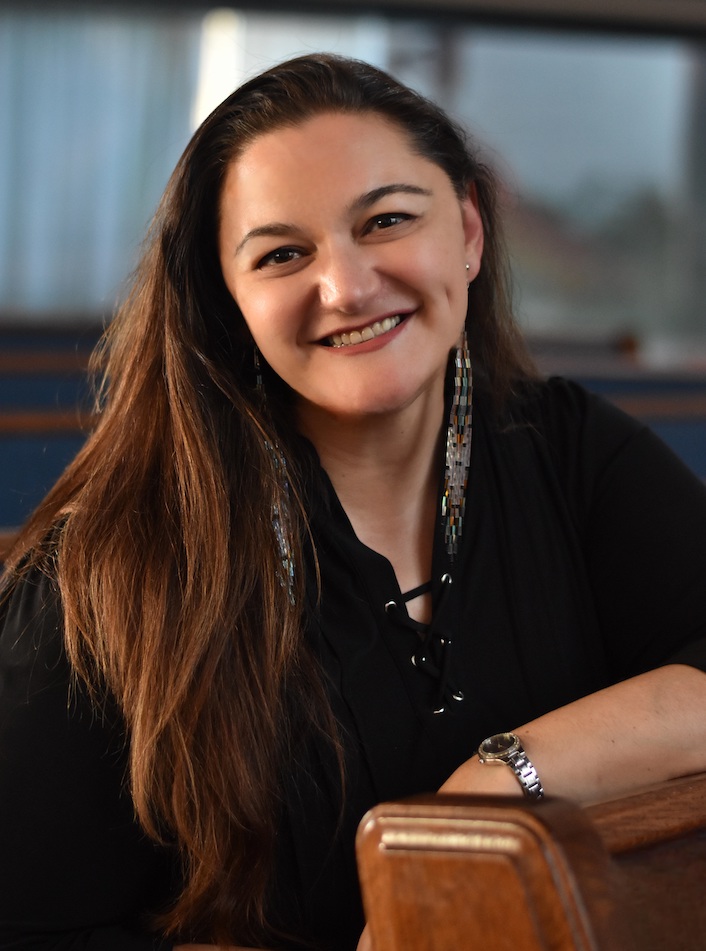
photo credit to Nelya Coomans
What do you think goodness is?
I think from a human perspective, it’s essentially the Golden Rule. If we treat others the way we wish to be treated, it is, in essence, goodness. We are all human, and we all make mistakes. However, intentions that reflect our ideals in our actions speak volumes. Goodness is treating people well, fulfilling our promises, and consistently trying to be the best version of ourselves. That carries over into every aspect of our lives, but most importantly in our daily interactions with those around us and those who observe and learn from us.
Who are you outside of your professional life?
When I’m not performing, practicing, running the opera company, composing, or writing, my full-time job is taking care of my five-year-old daughter. She has recently finished her second year of pre-school, takes dance, gymnastics, and swimming classes, and I’m starting to focus on teaching her basic piano and our Mvskoke language. I also have an 85-year-old father with whom I spend quite a bit of my time. My husband and I balance general life things, like household chores, while making sure we try to prioritize family time. I enjoy travel and reading, but don’t do much of either when I’m not on the road for work. I also am quite social, and I enjoy live theater, film, art, and culture in pretty much every capacity. I am also the person who finds the dog to play with at every party.
Are you interested in environmental issues?
While I hardly would consider myself an environmentalist, I think it’s important to go beyond not leaving anything worse than how you found it. I wrote a song for Yellowstone National Park’s 150th anniversary, which I premiered at the All Nations Teepee Village onsite at Yellowstone. It’s called “Reclaim the Land,” and although it sounds like it’s a “Land Back” movement type song, it’s more about being in sync with nature. The final line of the song text is “Reclaim the land, become part of the landscape again.” I think that I try to live with that in mind. We are no better than any other part of the land – we are part of it. If we operate with that mentality, we automatically become environmentally friendly.
Do you think the world is not a good place right now?
I think that we are seeing sides of people and cultures that are not always reflected well in a grand view. However, I think it is not much different than any other time in history. There has always been war, oppression, inequality, and other things that make news headlines. However, I also think that those who actively seek the good in people will generally find it, if not in individuals, in the grand scheme of cultures. At our core, we are all just people who want to live happy and fulfilling lives. The approach that people take to reach that goal is extremely varied. I think if people would try to find their similarities with others instead of focusing on their differences, the likelihood of understanding and compassion for others would increase.
How do you make the world a better place?
I think that there are certain things that I do that make my immediate surroundings a better place. I try to be kind to everyone, lead by example, and generally be a positive role model. Being an excellent colleague and friend is incredibly important to me, as well. However, I think my impact will be seen more in the long run. My goals for my legacy include representation as a Mvskoke woman in my field, showing the ability to be a successful artist while being a mother, and leaving behind works that focus on feminism and other advocacy issues through my writing and composition.
How can we all make the world a better place?
I think it’s very overwhelming if one is actively trying to make the world a better place daily. It’s much more doable to try to be a good person and lead by example. Some days, our best is just getting by. Other days, we can actively participate in projects and roles about which we feel strongly. I, personally, find that those who are kind to animals and children are the people that I find to be most influential in their immediate environments. If we each take small daily steps to try to do more for our fellow humans, we will make the world a better place.
How can science and spirituality coexist?
I think that the best scientists are often very spiritual. I remember one of my high school science teachers was very adamant in making sure that the religious students in my public high school knew that although she was teaching science through laws and theories, those theories could exist within faith. If we operate under the idea that we are given the ability to make scientific discoveries and advancements through a higher power, then science and spirituality can co-exist.
If you could go anywhere in the world, where would you go (and why)?
My dream vacation would be to SCUBA dive in the Maldives. I’m not certified to SCUBA, but I did do it once in Jamaica. I don’t realistically have the time or money to do that, but it would be my ideal vacation. I’ve heard it’s some of the best diving in the world.
For professional travel, I’d very much like to go to Asia, since I’ve never been, or anywhere in Europe. I studied in Salzburg for a year, and I’ve spent other time in Europe. I truly love everywhere I’ve been in Europe, but I think I would like to explore Greece, Spain, and Scandinavia most.
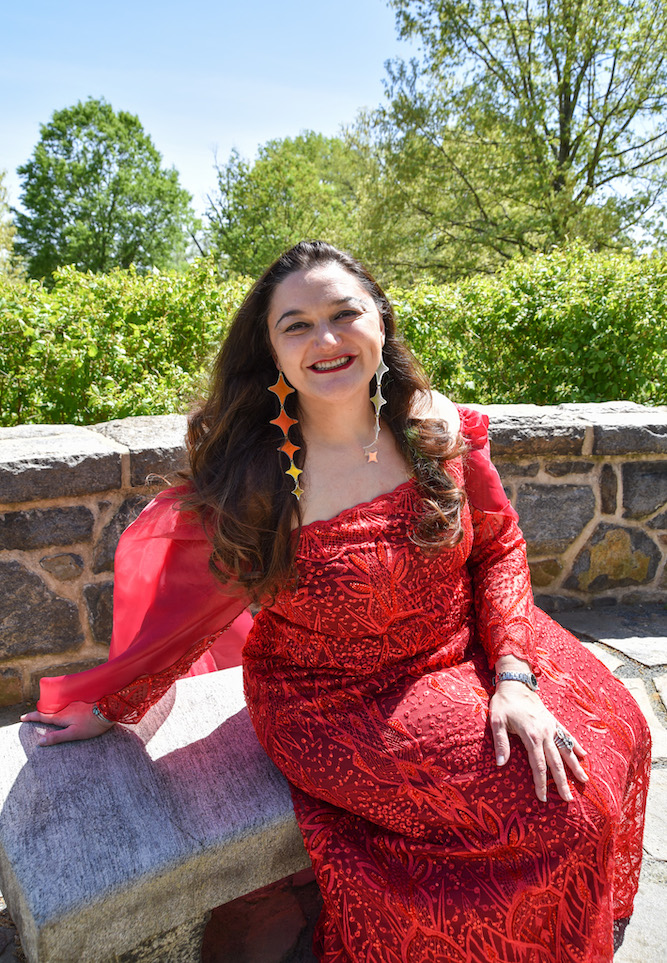
photo credit to Julie Smith
Is there anything else you'd like to share with us?
I have been incredibly fortunate, as well as having worked very hard for my entire life to achieve my goals. I think my tenacity is one of my most valuable traits, and I believe it is invaluable to success in every career. My biggest successes in my life have been when I’ve pushed myself past my comfort level and tried new things, even when the possibility of failure was high. I’ve been called fearless, but I think it’s more of taking calculated risks, while combining them with excellent preparation.
My career highlight, if I had to choose one, was combining my heritage, my family, and a very important career milestone in one event. I was able to open a concert with the PostClassical Ensemble at the Kennedy Center by singing the Mvskoke Lullaby with my daughter. Singing in our own Native language for our Kennedy Center debut was unmatched, and my pride in my child far surpassed my own accomplishments. While I’ve worked diligently to achieve all of my dreams, my favorite moments always include my family.
Please provide shareable links (website, social media)...
www.wilmingtonconcertopera.com
www.instagram.com/wilmingtonconcertopera
https://www.youtube.com/user/KirstenCKunkle
https://www.facebook.com/profile.php?id=100027352286438
Please provide media links to share...
Mvskoke Media coverage of Kennedy Center debut: https://www.youtube.com/watch?v=rTrGDazP0z0&t=7s
Reclaim the Land Premiere: https://www.youtube.com/watch?v=bxyh8vQ9K8Y&t=7s
Girondines West Coast Premiere: https://www.youtube.com/watch?v=ZW-jvzaRf9M&t=1090s
Hozho by Jerod Tate: https://www.youtube.com/watch?v=BuN-G1nQh5s
Related News









